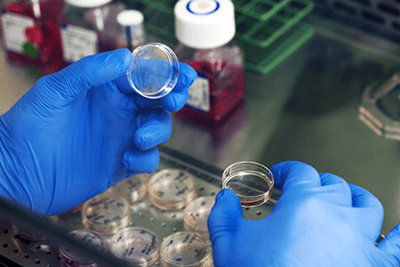
NCBiotech Grant Supports Precision Health Initiative In Western NC

use precision health techniques to improve medical care.
-- Courtesy of Mission Health & Hospital Fullerton Genetics Center
Funding from the North Carolina Biotechnology Center has enabled doctors in Western N.C. to use genetic testing to prescribe more effective medicines for their patients. It’s part of a larger center-led effort to promote the statewide growth and development of precision health.
A $45,000 NCBiotech Presidential Grant supported two recently completed pilot studies by Mission Health, the state’s sixth-largest health system. It serves an 18-county region in Western N.C.
Both studies used genetic testing to predict how individuals would respond to certain medications, a process known as pharmacogenomics. The first targeted rural primary care practices and tested patients over 65 years old. The second evaluated genetic testing as a way to select the best medications to treat pain, nausea, anxiety and depression in cancer patients. Provider education and training were major components of both projects.
The goal was to look at an each individual’s genetic makeup to figure out which medications would work best to increase patient benefits while minimizing side effects. Researchers also wanted to find ways to remove barriers to genetic testing and, ultimately, improve patient care while reducing costs.
NCBiotech grant explores "the tremendous potential of personalized medicine"
NCBiotech selected Mission Health for a presidential grant to support the system’s efforts to raise the level of healthcare in North Carolina. “We’re delighted with the progress they’ve made in exploring the tremendous potential of personalized medicine, specifically pharmacogenomics,” said Sara Imhof, Ph.D., senior director of precision health at NCBiotech. “And we’re excited about the opportunities for growth in this important area.”
Jonathan Snover, executive director of NCBiotech’s Western Office in Asheville, agreed. “Mission Health’s efforts to introduce precision medicine in Western North Carolina are a tremendous asset to the region,” he said. “By attracting talented healthcare experts who can secure funding and conduct this type of research, the health system is helping both to improve patient outcomes and reduce the cost of treatment.”
Mission Health is one of only a handful of community-based organizations in the nation to use pharmacogenomics as an assessment tool. Although genetic testing is usually associated with identifying the risks of developing a disease, like cancer, it also can individualize a patient’s treatment.

Lynn Dressler, DrPH, recently retired after leading the pilot studies for Mission Health, said results are promising. “The NCBiotech grant was really important; it provided the first opportunity for physicians to see for themselves how genetic testing can predict patient response to drugs,” she pointed out. “Mission’s personalized medicine program has touched hundreds of patients and dozens of physicians in the region so far. Both the patients and physicians who participated in the studies have been positive about their experiences.”
In addition to raising regional awareness, the studies have shown that it’s possible to conduct genetic testing in busy medical practices, Dressler said. They also support personalized medicine consulting as a way to increase the comfort level of physicians who want to use the technology.
That’s what Asheville family practice physician Michael Weisman experienced. “My participation in the study made me more comfortable with genetic testing as a diagnostic tool,” he said. “With a modest amount of explanation, primary care physicians can translate test results to patients during a routine office visit. And the technology has the potential to improve the quality of care, particularly for those who are at greatest risk because they’re taking multiple medications.”
Logistical challenges remain, however. Ordering genetic tests for patients; recording, retrieving and analyzing results; and getting help to evaluate more complex cases are among them. Mission Health’s Personalized Medicine Program is addressing those obstacles now.
Still, 92 percent of patients who participated in the studies said testing could help them and their doctors understand which medicines would best treat their medical conditions. And 93 percent reported positive experiences at Mission Health’s Personalized Medicine Clinic, which tests patients referred by area physicians, interprets results and provides clinical consultations.
The two pilot studies are in the process of being analyzed and submitted for publication.
